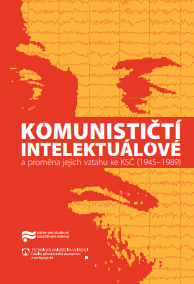Občan Brych a spol - Film, televize, intelektuálové a KSČ
Citizen Brych and co. - Movie, television, intellectuals and Communist party of Czechoslovakia
Author(s): Petr Kopal
Subject(s): Political history, Social history, Recent History (1900 till today), Post-War period (1950 - 1989), History of Communism, Film / Cinema / Cinematography
Published by: Ústav pro studium totalitních režimů
Keywords: Czechoslovakia; 20th century; intellectuals; movie; television; ideology;
Summary/Abstract: The first part of the study deals with specific function of the movies and TV in the communist system. Together with the repressive actions was the quasi-religious imagination a substance of modern totalitarism. It was quite similar to film propaganda, in other words – film was a main communist and Nazi tool for ideological manipulation. This tool provided the totalitarian regimes with the ability to change the whole society (including intellectuals) however it liked. Intellectuals of course played an important role as the enthusiastic creators of the film propaganda. In 1950s and 1960s the television became the principal “mouthpiece” of the communist ideology. Very soon a regimes own “think tank”, intellectual elites turned around and used mostly movies but television too to express critical opinions of many young dramaturgists, screenwriters and directors. The second part describes basic types of portrayal of intellectuals in television and movies: 1) Intellectual – asocial (enemy). He refuses to take part in creating of the new society, he undermines it and spreads ideological “infection”. Quite often we can find especially in the movies an example of hesitating intellectual, who “opens his eyes” and sets to work on the new society – becomes a member of the working class. In 1960s a perspective from “the other side” emerged and so did the type of intellectual-enemy/victim – Joke (Žert) and Larks on a String (Skřivánci na niti). 2) Intellectual-neutral. Intellectual is an apolitical person forced by the circumstances to express explicit view. In the 1950s is the most common intellectual the wavering, hesitant one, who eventually finds his way to the “right side”. 3) Intellectual-hero. The TV serials of the normalization era introduced rows of skilled specialist-communists with a college education. It was no longer true, that the right background was enough for holding a professional office.
Book: Komunističtí intelektuálové a proměna jejich vztahu ke KSČ (1945-1989)
- Page Range: 214-226
- Page Count: 13
- Publication Year: 2013
- Language: Czech
- Content File-PDF

